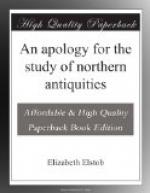There was nothing new in what Swift had said of the character of the English language; he was merely echoing criticisms which had been expressed frequently since the early sixteenth century. The number of English monosyllables was sometimes complained of, because to ears trained on the classical languages they sounded harsh, barking, unfitted for eloquence; sometimes because they were believed to impede the metrical flow in poetry; sometimes because, being particularly characteristic of colloquial speech, they were considered low; and often because they were associated with the languages of the Teutonic tribes which had escaped the full refining influence of Roman civilization. Swift followed writers like Nash and Dekker in emphasizing the first and last of these objections.
There were, of course, stock answers to these stock objections. Such criticism of one’s mother tongue was said to be unpatriotic or positively disloyal. If it was difficult to maintain that English was as smooth and euphonious as Italian, it could be maintained that its monosyllables and consonants gave it a characteristic and masculine brevity and force. Monosyllables were also very convenient for the formation of compound words, and, it was argued, should, when properly managed, be an asset rather than a handicap to the English rhymester. By the time Swift and Miss Elstob were writing, an increasing number of antiquarian Germanophils (and also pro-Hanoverians) were prepared to claim Teutonic descent with pride.
Most of these arguments had been bandied backwards
and forwards
rather inconclusively since the sixteenth century,
and Addison in
The Spectator No. 135 expresses a typically
moderate opinion on
the matter: the English language, he says, abounds
in monosyllables,
which gives us an opportunity of delivering
our thoughts in few
sounds. This indeed takes off from
the elegance of our tongue,
but at the same time expresses our ideas
in the readiest manner,
and consequently answers the first design
of speech better than
the multitude of syllables, which make
the words of other
languages more tunable and sonorous.
It is likely that neither Swift nor Miss Elstob would have found much to disagree with in that sentence. Swift certainly never proposed any reduction in the number of English monosyllables, and the simplicity of style which he described as “one of the greatest perfections in any language,” which seemed to him best exemplified in the English Bible, and which he himself practised so brilliantly, has in English a very marked monosyllabic character.
But in his enthusiasm to stamp out the practice of abbreviating, beheading and curtailing polysyllables—a practice which seemed to him a threat to both the elegance and permanence of the language— he described it as part of a tendency of the English to relapse into their Northern barbarity by multiplying monosyllables and eliding vowels between the rough and frequent consonants of their language. His ignorance of the historical origins of the language and his rather hackneyed remarks on its character do not invalidate the general scheme of his Proposal or his particular criticisms of current linguistic habits, but they did lay him open to the very penetrating and decisive attack of Elizabeth Elstob.




